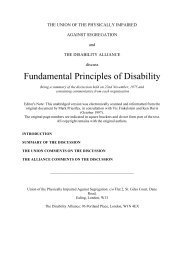Global-Report-Living-Colour-dr2-2
Global-Report-Living-Colour-dr2-2
Global-Report-Living-Colour-dr2-2
Create successful ePaper yourself
Turn your PDF publications into a flip-book with our unique Google optimized e-Paper software.
26<br />
Inclusive Communities = Stronger Communities<br />
GLOBAL REPORT ON ARTICLE 19: THE RIGHT TO LIVE AND BE INCLUDED IN THE COMMUNITY<br />
Self-advocates said:<br />
IN BARCELONA ...<br />
• We know what we want and how<br />
we want to live. We need the<br />
opportunity to express it and support<br />
to get there.<br />
• Few of us will choose an institution<br />
as a place to live. Support needs<br />
cannot override our wishes and<br />
wants of one's own life.<br />
• We have the ability to assume the<br />
responsibilities of independent living,<br />
with adequate supports.<br />
• The environments where we live give<br />
little credit to our desires and ability<br />
to manage an independent life and<br />
is a major obstacle.<br />
While the Universal Declaration of Human Rights<br />
recognizes the family as the “natural and fundamental<br />
group unit of society”, their role is even more critical in the<br />
lives of persons who have an intellectual disabilities. The<br />
very nature of intellectual disabilities, difficulty in learning,<br />
in remembering, in problem-solving and often in<br />
communicating, means that people who have an<br />
intellectual disabilities usually require some degree of<br />
lifelong support. As we heard from our members, most of<br />
this support comes from family members. A mother in<br />
Bolivia told us, “Most of my time is spent helping my<br />
daughter with everything she needs.” Or as one mother in<br />
Russia told us, “It’s a shame that a mother’s life stops after<br />
the birth of such child”. We think it should not be a shame<br />
or an undue burden.<br />
While most children without disabilities gradually require<br />
less and less support from their families as they grow up,<br />
and people with physical or sensory disabilities also start<br />
to develop more and more independence and less reliance<br />
on family, research has shown that after age 10, children<br />
with intellectual disabilities start to require<br />
disproportionately more support because:<br />
• The family member does not go to school or work<br />
and requires someone at home caring for him or her;<br />
• The family member can’t be left alone when parents<br />
and others go to work or to social occasions;<br />
• Parents need to devote time to finding supports and<br />
services, attending doctors’ appointments, etc.;<br />
• The family member requires assistance with daily life<br />
activities – feeding, bathing, toileting, etc.;<br />
• The family member needs help to find and keep a job.<br />
The nature of intellectual disabilities means that a person<br />
with an intellectual disabilities will usually require some<br />
form of lifelong support, and the responsibility for<br />
providing that support usually falls to families. The CRPD<br />
calls on families to “contribute towards the full and equal



